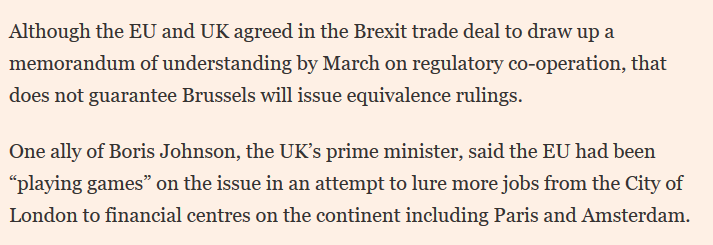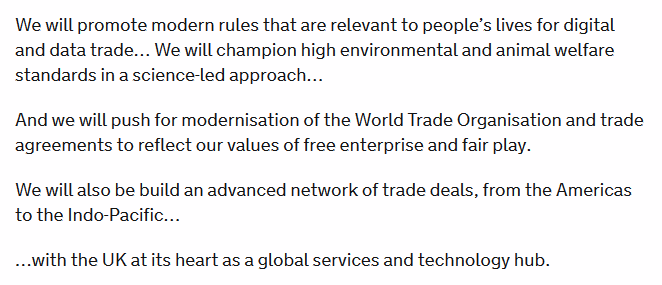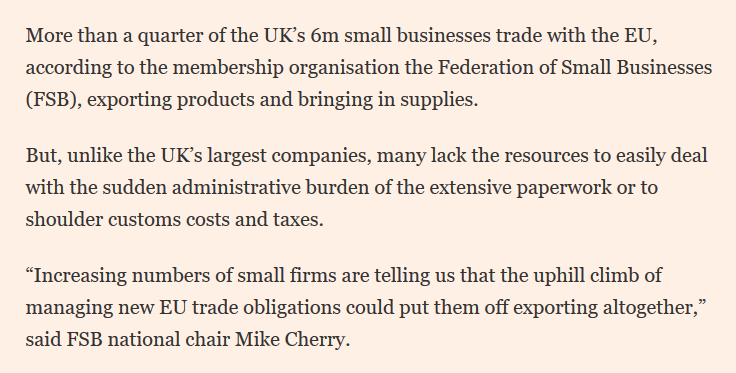
Small business in particular struggling with new Brexit red tape. Entirely predictable, and a function of a world trade system distorted against smaller traders. Stay with me a short while as Brexit threadmeister and story author @pmdfoster may say... 1/

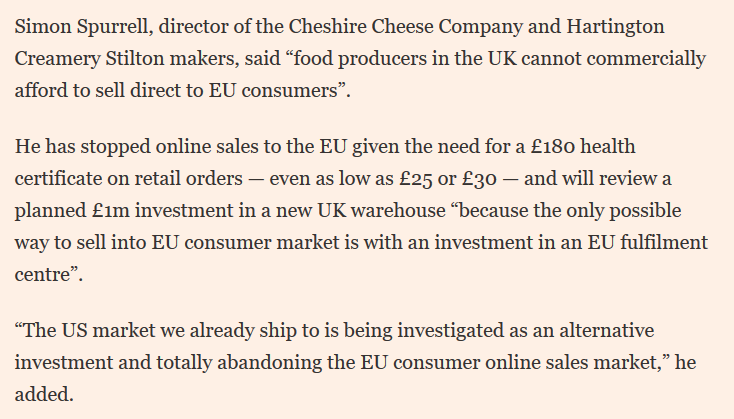
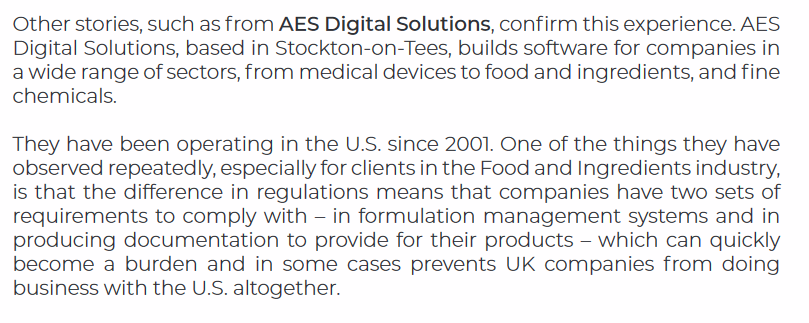
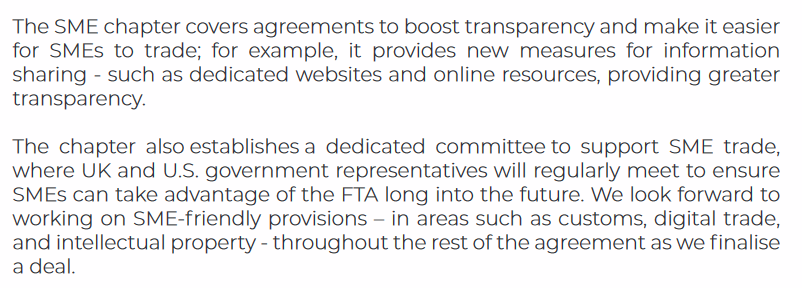
More from David Henig
So many stories of new barriers to trade between UK and EU, but you might be thinking at some point these will run out. The government is certainly hoping so. Well they may slow down, but trade relations and regulations are not static, and changes will lead to further problems.
The likelihood of continued trade problems for a £650 bn trade relationship is why there should be a huge cross-government effort led by the Foreign Office and Department for International Trade to put in place the necessary resources to seek best results.
There isn't.
So the UK's relationship with the EU currently consists of two not particularly good deals and no consistent effort to manage current problems or prevent future ones. Joint committees are a second order problem to putting in place the right internal structures.
But that's been the consistent UK problem in relations with the EU since 2016. Lack of focus on getting the right internal structures, people, asks, strategy, too much attention on being tough and a single leader.
News just in. This doesn't necessarily mean the right structure being put into UK-EU relations. I suspect Frost's main role is to ensure no renegotiations with the EU.
Also, wonder what this says about the PM's trust in Michael Gove?
The likelihood of continued trade problems for a £650 bn trade relationship is why there should be a huge cross-government effort led by the Foreign Office and Department for International Trade to put in place the necessary resources to seek best results.
There isn't.
So the UK's relationship with the EU currently consists of two not particularly good deals and no consistent effort to manage current problems or prevent future ones. Joint committees are a second order problem to putting in place the right internal structures.
But that's been the consistent UK problem in relations with the EU since 2016. Lack of focus on getting the right internal structures, people, asks, strategy, too much attention on being tough and a single leader.
News just in. This doesn't necessarily mean the right structure being put into UK-EU relations. I suspect Frost's main role is to ensure no renegotiations with the EU.
Also, wonder what this says about the PM's trust in Michael Gove?
NEW: David Frost is joining Boris Johnson\u2019s Cabinet! The peer has been appointed a minister at the Cabinet Office, effective March 1.
— Sebastian Payne (@SebastianEPayne) February 17, 2021
Frost will also chair the partnership council overseeing the UK-EU trade deal and oversee reform to "maximise on the opportunities of Brexit"
We need to talk about UK politics. More specifically we need to talk about the absence of opposition to a no-deal Brexit risking Scottish independence, Northern Irish peace, the end of the mass market car industry, more expensive food, and damaged relations with US and EU 1/n
Project fear and the red wall. The first meaning that every serious threat, such as that of Nissan that their plant will be unsustainable, is dismissed with little discussion. The red wall, apparently so angry with Labour about the EU they are afraid to have a position. 2/
Because 'sovereignty' apparently. But a particularly nefarious form of sovereignty in which the normal kind of things you discuss in a Free Trade Agreement - shared rules, access to waters - become when discussed with the EU unacceptable infringements and threats. 3/
You note in the UK we aren't having a discussion on what level playing field rules or access to fishing waters might be acceptable. Or normal. Or even what we might want, like shared increased commitments on climate change. No, all rumours. Evil EU. Worse French. 4/
Those who follow closely see incredible briefings in the papers, like today claiming the EU demand for raising minimum shared standards was only raised on Thursday, treated as fact. This was known months ago. But the media too often just reports the spin as fact. 5/
UK cabinet to back Johnson over no-deal Brexit - The Times https://t.co/uCuOTsNdJL pic.twitter.com/88x5Tw2g53
— Reuters (@Reuters) December 6, 2020
Project fear and the red wall. The first meaning that every serious threat, such as that of Nissan that their plant will be unsustainable, is dismissed with little discussion. The red wall, apparently so angry with Labour about the EU they are afraid to have a position. 2/
Because 'sovereignty' apparently. But a particularly nefarious form of sovereignty in which the normal kind of things you discuss in a Free Trade Agreement - shared rules, access to waters - become when discussed with the EU unacceptable infringements and threats. 3/
You note in the UK we aren't having a discussion on what level playing field rules or access to fishing waters might be acceptable. Or normal. Or even what we might want, like shared increased commitments on climate change. No, all rumours. Evil EU. Worse French. 4/
Those who follow closely see incredible briefings in the papers, like today claiming the EU demand for raising minimum shared standards was only raised on Thursday, treated as fact. This was known months ago. But the media too often just reports the spin as fact. 5/
More from Brexit
A not-so-little thread on how post-Brexit work permit regulations will apply in Scottish football and why it’s, broadly, not a good thing...
1) Work permit calculations are based on the points formula from this site - https://t.co/sjqx8Df7Zg
As things stand, while this article deals with England, the system applies to Scotland also.
The goal is 15 points and the article shows various ways to get there. Essentially, play regularly internationally or in a top 5 league and you’re in. But read the article because it’s a bit trickier than that.
2) There are elements of this I’d dispute. For example, here’s the banding of leagues and, lower down, it’s an absolute mess - Denmark (ranked 14 in coefficient table) and Serbia (16) banded lower than Croatia (20), Greece (18) and Czechs (19)? It’s wholly random.

I get the point that leagues should be banded, but there doesn’t seem to have been loads of sense applied to how these things are actually banded, rather they’ve just shoved a bunch of leagues together and hoped for the best.
1) Work permit calculations are based on the points formula from this site - https://t.co/sjqx8Df7Zg
As things stand, while this article deals with England, the system applies to Scotland also.
The goal is 15 points and the article shows various ways to get there. Essentially, play regularly internationally or in a top 5 league and you’re in. But read the article because it’s a bit trickier than that.
2) There are elements of this I’d dispute. For example, here’s the banding of leagues and, lower down, it’s an absolute mess - Denmark (ranked 14 in coefficient table) and Serbia (16) banded lower than Croatia (20), Greece (18) and Czechs (19)? It’s wholly random.

I get the point that leagues should be banded, but there doesn’t seem to have been loads of sense applied to how these things are actually banded, rather they’ve just shoved a bunch of leagues together and hoped for the best.
You May Also Like
🌿𝑻𝒉𝒆 𝒔𝒕𝒐𝒓𝒚 𝒐𝒇 𝒂 𝑺𝒕𝒂𝒓 : 𝑫𝒉𝒓𝒖𝒗𝒂 & 𝑽𝒊𝒔𝒉𝒏𝒖
Once upon a time there was a Raja named Uttānapāda born of Svayambhuva Manu,1st man on earth.He had 2 beautiful wives - Suniti & Suruchi & two sons were born of them Dhruva & Uttama respectively.
#talesofkrishna https://t.co/E85MTPkF9W

Now Suniti was the daughter of a tribal chief while Suruchi was the daughter of a rich king. Hence Suruchi was always favored the most by Raja while Suniti was ignored. But while Suniti was gentle & kind hearted by nature Suruchi was venomous inside.
#KrishnaLeela

The story is of a time when ideally the eldest son of the king becomes the heir to the throne. Hence the sinhasan of the Raja belonged to Dhruva.This is why Suruchi who was the 2nd wife nourished poison in her heart for Dhruva as she knew her son will never get the throne.

One day when Dhruva was just 5 years old he went on to sit on his father's lap. Suruchi, the jealous queen, got enraged and shoved him away from Raja as she never wanted Raja to shower Dhruva with his fatherly affection.

Dhruva protested questioning his step mother "why can't i sit on my own father's lap?" A furious Suruchi berated him saying "only God can allow him that privilege. Go ask him"

Once upon a time there was a Raja named Uttānapāda born of Svayambhuva Manu,1st man on earth.He had 2 beautiful wives - Suniti & Suruchi & two sons were born of them Dhruva & Uttama respectively.
#talesofkrishna https://t.co/E85MTPkF9W

Prabhu says i reside in the heart of my bhakt.
— Right Singh (@rightwingchora) December 21, 2020
Guess the event. pic.twitter.com/yFUmbfe5KL
Now Suniti was the daughter of a tribal chief while Suruchi was the daughter of a rich king. Hence Suruchi was always favored the most by Raja while Suniti was ignored. But while Suniti was gentle & kind hearted by nature Suruchi was venomous inside.
#KrishnaLeela

The story is of a time when ideally the eldest son of the king becomes the heir to the throne. Hence the sinhasan of the Raja belonged to Dhruva.This is why Suruchi who was the 2nd wife nourished poison in her heart for Dhruva as she knew her son will never get the throne.

One day when Dhruva was just 5 years old he went on to sit on his father's lap. Suruchi, the jealous queen, got enraged and shoved him away from Raja as she never wanted Raja to shower Dhruva with his fatherly affection.

Dhruva protested questioning his step mother "why can't i sit on my own father's lap?" A furious Suruchi berated him saying "only God can allow him that privilege. Go ask him"



